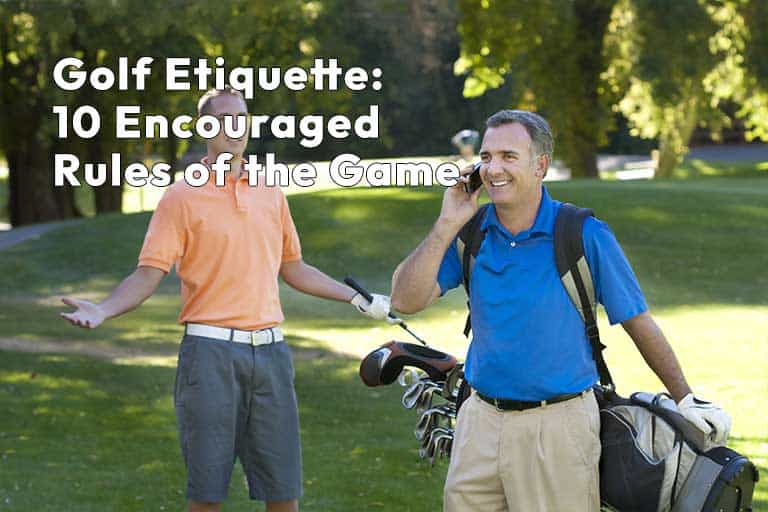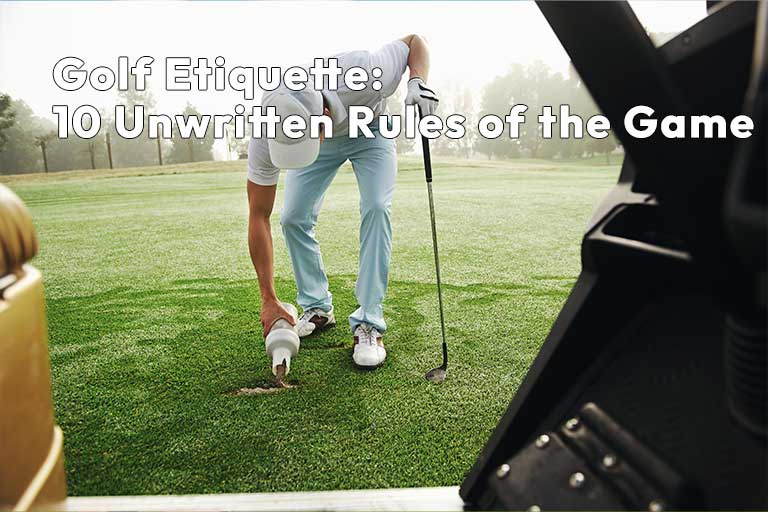Table of Contents
Golf, at its core, is more than just a game it’s a dance of discipline, tradition, and unspoken rules that bind players in a unique camaraderie and mutual respect. While the thrill of a well-struck drive or the satisfaction of a putt rolling smoothly into the cup might draw us to the game, it’s the rich tapestry of etiquette that keeps the sport honorable and enjoyable for all. Today, we’re diving deep into the heart of golf etiquette, unearthing those unwritten rules that every golfer, whether seasoned or new to the green, should live by. Strap in, because we’re not just skimming the surface; we’re exploring the very fabric of what makes golf the gentleman’s game.
Learn Golf Etiquette Tips
- Avoid disrupting players: Don’t stand in their line of sight, walk through their line, or talk during their swing.
- Respect the game: Follow rules like not hitting into the group ahead, not playing music, and repairing divots.
- Be considerate: Don’t take too long for shots, looking for balls, or giving unsolicited advice.
1. Don’t Stand in a Players Line of Sight
Nothing breaks concentration quite like having someone loom in your peripheral vision as you’re about to take a swing. I recall a round where a fellow player, unaware of this cardinal sin, stood directly behind my ball, causing an involuntary flinch in my swing. It’s a matter of respect and safetykeeping out of a player’s line of sight ensures that their focus remains unbroken and that you’re not in harm’s way should the shot go awry.
Insider Tip: Position yourself either behind or well ahead of the player, but always out of their direct line to the hole. Its a simple act of courtesy that speaks volumes.
2. Don’t Walk Through a Players Line
The greens are sacred, and the path a ball takes to the hole is hallowed ground. Walking across someone’s line, especially on the green, can alter the putt’s trajectory by affecting the grass’s lay. I learned this lesson the hard way during my early days on the course, earning a stern but fair lecture from a more experienced golfer. The integrity of the game lies in these small acts of consideration.
3. Don’t Talk During a Players Swing
Silence is golden, particularly in golf. There’s an unspoken pact that when a player sets up for their shot, the world around them falls silent. This respect for concentration isn’t just about tradition; it’s about providing a space where each player can fully engage with their skill and the challenge at hand. Personal anecdotes abound of critical shots flubbed due to ill-timed comments or ringtoneslet’s not add to that number.

4. Don’t Hit into the Group in Front of You
Patience is not just a virtue; it’s a necessity on the golf course. The urge to keep play moving is understandable, but never at the risk of endangering others. I’ve been on both ends of this scenariofeeling the rush of adrenaline as a ball whizzes past and the chagrin of realizing my own shot was too hastily made. It’s a stark reminder that our actions on the course affect not just our game, but the safety and enjoyment of others.
5. Don’t Play Music on the Course
Golf is a symphony of soundsthe whisper of the wind, the crisp strike of the ball, the gentle rustle of leaves. Introducing external music into this natural concert is akin to doodling on a masterpiece. It disrupts not only your concentration but that of everyone within earshot. While tunes may be a staple of other leisure activities, the golf course calls for a different kind of playlistone of nature and focus.
6. Don’t Take Too Long to Look for a Lost Ball
The search for a lost ball is a rite of passage, yet one that should be undertaken with mindfulness. The official rule caps the search at three minutes, a guideline born of practicality and respect for the pace of play. There’s a certain camaraderie in the shared search, a collective pause that underscores the game’s social aspect, but it’s one that must be tempered with consideration for those waiting their turn.
7. Don’t Take Too Long to Play a Shot
Analysis paralysis is the enemy of pace. Taking too long to play a shot not only slows down the game for your group but for everyone on the course. Early in my golfing journey, I was guilty of overthinking each shot, until a mentor impressed upon me the virtue of decisiveness. A brisk pace keeps the game flowing smoothly, ensuring that all players can fully enjoy their time on the course.
8. Don’t Give Advice Unless Asked
Unsolicited advice, no matter how well-intentioned, often falls flat. Golf is a deeply personal journey, and each player has their unique style and strategy. Offering guidance without invitation can come across as presumptuous and can inadvertently add pressure or doubt. I’ve learned that the best support we can offer our fellow players is encouragement and space to navigate their own path.
9. Don’t Stand Too Close to a Player Hitting a Shot
Personal space is a concept that extends with full force onto the golf course. Standing too close to a player not only invades their physical space but can intrude on their mental preparation as well. The golf swing is an intricate dance requiring focus and freedom of movementboth of which are compromised if another player is too close. Respect the bubble, and you’ll find it’s reciprocated tenfold.
10. Don’t Forget to Repair Your Divots and Ball Marks
Leaving the course as you found it is a principle that transcends golf, touching on the broader ethos of respect for nature and fellow players. Repairing divots and ball marks is a simple act, yet it speaks volumes about your character and respect for the game. I’ve always found a certain satisfaction in smoothing over a ball mark, a small but meaningful contribution to the course’s beauty and playability.

Real-Life Example: Understanding Golf Etiquette
Maria’s Experience with Golf Etiquette
Maria, an avid golfer, recalls a time when she was playing a round with friends. As they approached the green, one of her friends unknowingly stood in her line of sight while she was preparing to putt. Maria found it challenging to focus with the distraction, and her friend’s well-intentioned advice only added to the pressure.
After the game, Maria took the opportunity to explain to her friend the importance of not standing in someone’s line of sight on the green. She emphasized how it can affect the player’s concentration and ultimately their performance. Her friend, appreciative of the feedback, made a conscious effort to be more mindful of this golf etiquette rule in future games.
This experience not only improved Maria’s friend’s understanding of golf etiquette but also strengthened their bond through open communication and a shared love for the game. It highlighted the significance of respecting these unwritten rules to enhance the overall golfing experience for everyone involved.
Post-Round Etiquette: Shaking Hands, Settling Scores, and the 19th Hole Traditions
As the round winds down, the rituals of camaraderie come to the fore. Shaking hands, irrespective of the day’s frustrations or triumphs, is a gesture of mutual respect that I hold dear. Settling scores, both on the card and any wagers made, is done promptly and with good humor, for in golf, the spirit of the game is always bigger than the outcome of any single match. And then there’s the 19th holea tradition steeped in fellowship, where tales of the day’s play are shared over a well-earned drink. It’s here, in the recounting and the laughter, that the true spirit of golf shines brightest.
In closing, golf is more than a game of skillit’s a testament to character, respect, and the enduring bond between those who play. The unwritten rules we’ve explored are the threads that weave the rich tapestry of golf’s tradition, a tradition that each of us, with every round we play, helps to preserve and enrich. Let’s hold these principles close, for in doing so, we honor not only the game but each other.
For those embarking on this journey or looking to deepen their understanding, the path to mastering golf’s intricacies is rich with learning and camaraderie. Whether it’s refining your technique (proper golf grip: get your hands right) or embracing the mental aspect of the game (avoid three putts), every step is a step towards a richer, more fulfilling golf experience. Welcome to the dance.
Common Questions
What is post-round etiquette in golf?
Post-round etiquette in golf includes shaking hands, settling scores, and observing 19th hole traditions.
How should I shake hands after a round of golf?
Shake hands firmly with your playing partners after a round of golf to show respect and sportsmanship.
What are some common 19th hole traditions in golf?
Common 19th hole traditions in golf include buying drinks, sharing stories, and relaxing after a round.
Who should be responsible for settling scores after a round of golf?
Golfers should take responsibility for settling scores after a round by ensuring accuracy and honesty.
How can I politely decline participating in 19th hole traditions?
Politely decline participating in 19th hole traditions by thanking your playing partners and excusing yourself respectfully.
What if my playing partners do not want to shake hands after a round?
If your playing partners do not want to shake hands after a round, respect their decision and simply thank them for the game.





